HOME >> CHINA
Unscrupulous NGOs fund, instigate HK rioters
By Hu Yuwei and Li Lei Source:Global Times Published: 2019/12/25 22:47:31 Last Updated: 2019/12/26 20:06:42
○ Some so-called foundations and NGOs encourage and instigate rioters to continue pursuing their goals in extreme ways, making it harder for the chaos in Hong Kong to end
○ Experts call for a more intensified crackdown on protest financiers to end the chaos and restore order in Hong Kong
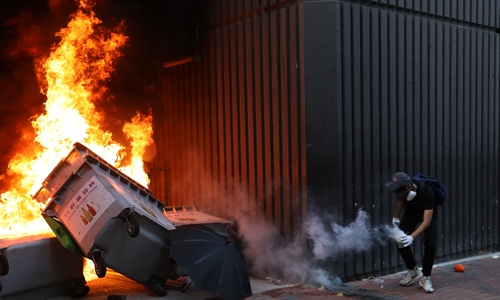
Amid ongoing chaos and protests in Hong Kong, some NGOs there have increasingly played a role of accelerating street violence as they fund radical and illegal street protesters and call for donations to those arrested for violence.
On December 19, Hong Kong police arrested four members of Spark Alliance, an online fundraising platform that raises money to aid illegal protesters, on the charge of money laundering.
Some rioters vandalized and set fire to the HSBC Mong Kok branch on Christmas Eve after the bank closed Spark Alliance's account in November in adherence to its global standards. HSBC said Wednesday that it is "saddened and disappointed by the acts of vandalism" at its branch.
Similar organizations including "612 Humanitarian Relief Fund," "Justice Defense Fund," and many others have a record of scandal and financial misconduct documented by Hong Kong media. Experts call for a more intensified crackdown on these organizations' funds to restore order in Hong Kong.
The police also froze HK$70 million ($9 million) in Spark Alliance's funds and insurance products, the total of which was incommensurate with its beneficiary. The suspicious financial transaction triggered public criticism against its potential corrupt behavior, some Hong Kong media reported.
"We also do not exclude the possibility that the funds were used as a reward to encourage teens to come out and join the civil unrest," police said on December 19.
Freezing the assets of organizations that contribute to illicit violence is an important step in stopping violence, said experts.
These so-called foundations and NGOs encourage and instigate rioters to continue pursuing their goals in extreme ways. The agencies have made it harder for the region's chaos to end as quickly as possible, Li Haidong, a professor at the China Foreign Affairs University's Institute of International Relations, told the Global Times.
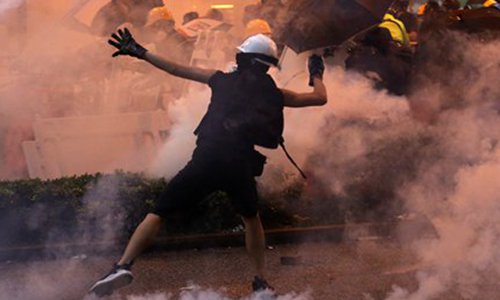
Spark Alliance, set up after the 2016 Mong Kok riot to help arrested or jailed activists, had crowdfunded about HK$80 million over the past six months, police said. It also claimed to raise funds for legal and medical costs of the indicted.
According to its website, support includes free arrest bail and legal advice, in-court escorts and emergency medical assistance, visits and assistance to prisoners and their families, and re-employment after release. But the true destination of the money is mysteriously unaccountable.
In the past, financial reports of the alliance have not been made public, Hong Kong news site hk01.com reported.
On its Facebook page, Spark Alliance frequently posts calls for donations and birthday wishes for arrested rioters, referring to them as innocent casualties or "warriors."
In response, Spark Alliance denied allegations of money laundering and said police were "smearing" them, claiming it would continue to provide "full support" to those arrested for involvement in illegal assembly and violence.
Former Hong Kong chief executive Leung Chun-ying applauded the police operation, calling it a "major discovery" and "major breakthrough," as well as pressing further investigations into Spark Alliance's funding sources.
According to Wen Wei Po, the Spark Alliance members are mainly from some pro-secession organizations such as the Hong Kong National Front. Since there was no bank account in their early days, the donations were all in cash, drawing accusation that some of its members were committed to "financial fraud, false accounting and embezzlement."
Last month, HSBC closed a corporate account used by Spark Alliance after finding its activities did not match the business purposes stated by the client, Hong Kong media reported.
HSBC was boycotted by Spark Alliance followers soon after its accounts were frozen. Some extreme followers even directed their anger to HSBC staff involved in closing the account by exposing personal information of the staff on social media, Beijing Daily reported.
One of its early organizers, Ray Wong Toi-yeung, was found to have a six-digit amount of money in cash, much of it from donations, when he was arrested.
Those organizers claiming to struggle for others are likely to plunder donations amid the chaos, and take the chances to collect money for themselves or misuse the donations, according to experts reached by the Global Times.
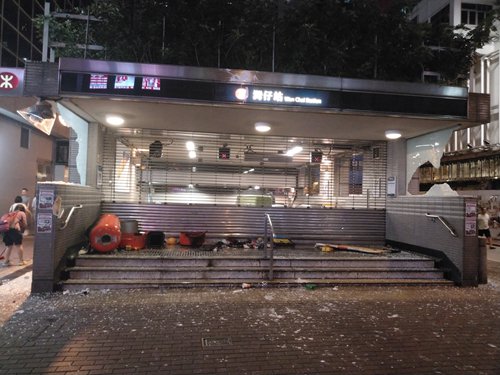
Other similar institutions include the 612 Humanitarian Relief Fund, another NGO with the specific goal of raising funds for the anti-extradition bill riots since it was established on June 15.
Its money mainly flows toward providing legal, medical, psychological and financial support to rioters who claimed to be injured or arrested in the riots, according to a report by the Beijing Daily.
With influential Hong Kong separatists and activists such as Denise Ho Wan-see, Margaret Ng Ngoi-yee, Hui Po-keung and Ho Sau-lan as its temporary trustees, the fund has raised more than HK$97 million by the end of November, according to its financial briefing released online, Hong Kong news website hk01.com reported on December 19.
The fund also received large amount of money from the Apple Daily, founded by Lai Chee-ying, regarded by many as a traitor who seeks to separate Hong Kong from China.
According to its work report, the fund has provided for 1,845 rioters.
The fund calls itself backup for rioters. But when rioters sought legal aid from the fund, it told them to apply for governmental legal aid and claimed on its social media account that the funds raised were running out since a violent riot costs at least HK$1.8 million for attorney fees, the Ta Kung Pao reported on December 13.
The report said that the claim caused conflicts among rioters.
The fund was also reported as charging high administrative fees to support its own employees. There are also problems with its so-called legal aid. For example, their attorneys reportedly picked "clients," and some rioters said they had been treated indifferently by the fund.
Leung Yik-ting, Central Committee member at Democratic Party of Hong Kong, criticized the fund on her Facebook account on December 10 for poor accountability and treating applicants differently.
The fund later released a statement saying that it will support rioters to get access to legal service in the entire legal process but remained silent on the accusations of treating applicants differently.
Some rioters commented on the statement with disappointment with the 612 Humanitarian Relief Fund, saying that "donating money is the worst decision I've ever made."
To efficiently diffuse the street chaos in Hong Kong requires authorities and the police to keep tracking and cracking down on the institutions giving support to illegal protesters, Li said.
"Hong Kong police have to be prepared for a long struggle with these institutions, to cut off their resources, effectively ease the chaos and reverse an unhealthy political ecology", Li added.
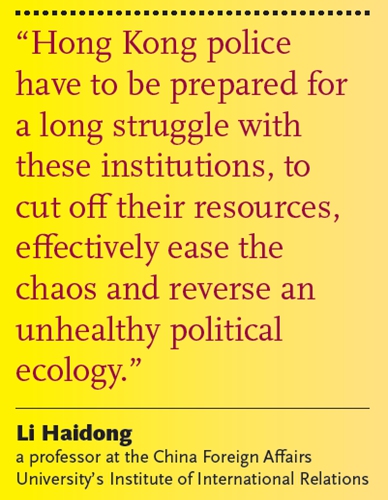
Outside manipulator
Many of the "human rights" institutions in Hong Kong that played a role in the previous and current riots were often reportedly linked to similar organizations outside Hong Kong.
George Soros, a Hungarian-American businessman, is also believed to have a hand in Hong Kong. After he tried and failed to break Hong Kong dollar's peg to the US currency during the Asian financial crisis in 1998, Soros founded the Open Society Foundations (OSF) based in New York, in 1999. A report shows that OSF invested in multiple "human rights" websites in many countries and regions including Hong Kong.
Despite there being no office in Hong Kong, the OSF keeps close ties with some Hong Kong representatives from previous street protests. The OSF was active in Faculty of Law of the University of Hong Kong and the university's Center for Comparative and Public Law in 2015, and Occupy Central leader Tai Yiu-ting worked in both departments, the Ta Kung Pao reported.
Additionally, the Foreign Correspondents' Club (FCC), Hong Kong, once sought financial aid from the OSF and Lai Chee-ying. The FCC submits work reports to the OSF. Thomas Kellogg, a liaison between the OSF and FCC, even once proposed a plan to manipulate China's diplomatic policy at a meeting of OSF, reported the Ta Kung Pao.
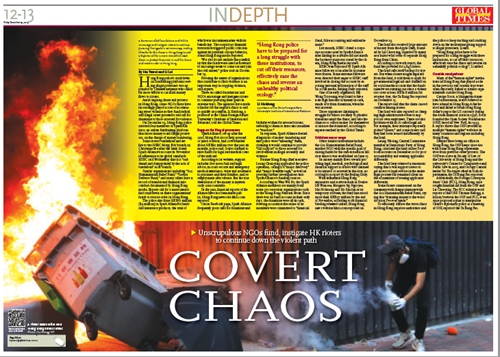
Newspaper headline: Covert Chaos
○ Experts call for a more intensified crackdown on protest financiers to end the chaos and restore order in Hong Kong

A rioter starts a fire on a Hong Kong street corner. Photo: Cui Meng/ GT
Hong Kong police's crackdown on fundraising platforms serving illegal protesters was applauded by Chinese netizens who called for more efforts to cut illicit money flows to rioters.Amid ongoing chaos and protests in Hong Kong, some NGOs there have increasingly played a role of accelerating street violence as they fund radical and illegal street protesters and call for donations to those arrested for violence.
On December 19, Hong Kong police arrested four members of Spark Alliance, an online fundraising platform that raises money to aid illegal protesters, on the charge of money laundering.
Some rioters vandalized and set fire to the HSBC Mong Kok branch on Christmas Eve after the bank closed Spark Alliance's account in November in adherence to its global standards. HSBC said Wednesday that it is "saddened and disappointed by the acts of vandalism" at its branch.
Similar organizations including "612 Humanitarian Relief Fund," "Justice Defense Fund," and many others have a record of scandal and financial misconduct documented by Hong Kong media. Experts call for a more intensified crackdown on these organizations' funds to restore order in Hong Kong.
The police also froze HK$70 million ($9 million) in Spark Alliance's funds and insurance products, the total of which was incommensurate with its beneficiary. The suspicious financial transaction triggered public criticism against its potential corrupt behavior, some Hong Kong media reported.
"We also do not exclude the possibility that the funds were used as a reward to encourage teens to come out and join the civil unrest," police said on December 19.
Freezing the assets of organizations that contribute to illicit violence is an important step in stopping violence, said experts.
These so-called foundations and NGOs encourage and instigate rioters to continue pursuing their goals in extreme ways. The agencies have made it harder for the region's chaos to end as quickly as possible, Li Haidong, a professor at the China Foreign Affairs University's Institute of International Relations, told the Global Times.

A Hong Kong protester throws a tear gas grenade at police. Photo: Cui Meng/GT
Support for illegal protestersSpark Alliance, set up after the 2016 Mong Kok riot to help arrested or jailed activists, had crowdfunded about HK$80 million over the past six months, police said. It also claimed to raise funds for legal and medical costs of the indicted.
According to its website, support includes free arrest bail and legal advice, in-court escorts and emergency medical assistance, visits and assistance to prisoners and their families, and re-employment after release. But the true destination of the money is mysteriously unaccountable.
In the past, financial reports of the alliance have not been made public, Hong Kong news site hk01.com reported.
On its Facebook page, Spark Alliance frequently posts calls for donations and birthday wishes for arrested rioters, referring to them as innocent casualties or "warriors."
In response, Spark Alliance denied allegations of money laundering and said police were "smearing" them, claiming it would continue to provide "full support" to those arrested for involvement in illegal assembly and violence.
Former Hong Kong chief executive Leung Chun-ying applauded the police operation, calling it a "major discovery" and "major breakthrough," as well as pressing further investigations into Spark Alliance's funding sources.
According to Wen Wei Po, the Spark Alliance members are mainly from some pro-secession organizations such as the Hong Kong National Front. Since there was no bank account in their early days, the donations were all in cash, drawing accusation that some of its members were committed to "financial fraud, false accounting and embezzlement."
Last month, HSBC closed a corporate account used by Spark Alliance after finding its activities did not match the business purposes stated by the client, Hong Kong media reported.
HSBC was boycotted by Spark Alliance followers soon after its accounts were frozen. Some extreme followers even directed their anger to HSBC staff involved in closing the account by exposing personal information of the staff on social media, Beijing Daily reported.
One of its early organizers, Ray Wong Toi-yeung, was found to have a six-digit amount of money in cash, much of it from donations, when he was arrested.
Those organizers claiming to struggle for others are likely to plunder donations amid the chaos, and take the chances to collect money for themselves or misuse the donations, according to experts reached by the Global Times.

Mass left by radical Hong Kong protesters outside Wan Chai MTR station. Photo: Li Qiaoyi/GT
Criticism never stopsOther similar institutions include the 612 Humanitarian Relief Fund, another NGO with the specific goal of raising funds for the anti-extradition bill riots since it was established on June 15.
Its money mainly flows toward providing legal, medical, psychological and financial support to rioters who claimed to be injured or arrested in the riots, according to a report by the Beijing Daily.
With influential Hong Kong separatists and activists such as Denise Ho Wan-see, Margaret Ng Ngoi-yee, Hui Po-keung and Ho Sau-lan as its temporary trustees, the fund has raised more than HK$97 million by the end of November, according to its financial briefing released online, Hong Kong news website hk01.com reported on December 19.
The fund also received large amount of money from the Apple Daily, founded by Lai Chee-ying, regarded by many as a traitor who seeks to separate Hong Kong from China.
According to its work report, the fund has provided for 1,845 rioters.
The fund calls itself backup for rioters. But when rioters sought legal aid from the fund, it told them to apply for governmental legal aid and claimed on its social media account that the funds raised were running out since a violent riot costs at least HK$1.8 million for attorney fees, the Ta Kung Pao reported on December 13.
The report said that the claim caused conflicts among rioters.
The fund was also reported as charging high administrative fees to support its own employees. There are also problems with its so-called legal aid. For example, their attorneys reportedly picked "clients," and some rioters said they had been treated indifferently by the fund.
Leung Yik-ting, Central Committee member at Democratic Party of Hong Kong, criticized the fund on her Facebook account on December 10 for poor accountability and treating applicants differently.
The fund later released a statement saying that it will support rioters to get access to legal service in the entire legal process but remained silent on the accusations of treating applicants differently.
Some rioters commented on the statement with disappointment with the 612 Humanitarian Relief Fund, saying that "donating money is the worst decision I've ever made."
To efficiently diffuse the street chaos in Hong Kong requires authorities and the police to keep tracking and cracking down on the institutions giving support to illegal protesters, Li said.
"Hong Kong police have to be prepared for a long struggle with these institutions, to cut off their resources, effectively ease the chaos and reverse an unhealthy political ecology", Li added.

Outside manipulator
Many of the "human rights" institutions in Hong Kong that played a role in the previous and current riots were often reportedly linked to similar organizations outside Hong Kong.
George Soros, a Hungarian-American businessman, is also believed to have a hand in Hong Kong. After he tried and failed to break Hong Kong dollar's peg to the US currency during the Asian financial crisis in 1998, Soros founded the Open Society Foundations (OSF) based in New York, in 1999. A report shows that OSF invested in multiple "human rights" websites in many countries and regions including Hong Kong.
Despite there being no office in Hong Kong, the OSF keeps close ties with some Hong Kong representatives from previous street protests. The OSF was active in Faculty of Law of the University of Hong Kong and the university's Center for Comparative and Public Law in 2015, and Occupy Central leader Tai Yiu-ting worked in both departments, the Ta Kung Pao reported.
Additionally, the Foreign Correspondents' Club (FCC), Hong Kong, once sought financial aid from the OSF and Lai Chee-ying. The FCC submits work reports to the OSF. Thomas Kellogg, a liaison between the OSF and FCC, even once proposed a plan to manipulate China's diplomatic policy at a meeting of OSF, reported the Ta Kung Pao.

Newspaper headline: Covert Chaos
Posted in: IN-DEPTH